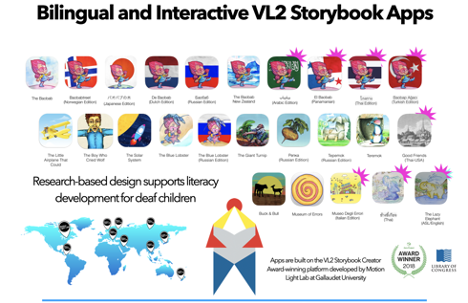
Creating a signing world
This development occurs so early in life– from birth to age three. As one matures from a baby to a child, they accumulate new words, which are stockpiled in an ever-expanding mental library. Most of us may remember learning to read and write through school. However, the languages we use to talk, express, and think are innate. The same cannot be said for Deaf children. Immediate access to their native language — sign language– is not simply given. 95 percent of deaf children are born to hearing families. Their access to sign language requires intent. This means sign language has to be learned, provided, and incorporated within a family unit. For a visual child, sign language is the pathway to developing foundations, healthy cognitive growth, and overall well-being. Yet in the United States, 88 percent of those hearing families do not sign. This is troubling on many levels. For one, this means the deaf child grows up without access to sign language and is at risk for language deprivation. Language deprivation has a serious lifelong impact on literacy, academia, and overall development. Language deprivation also walks hand in hand with emotional and mental trauma. Additionally, researchers have found that Adverse Childhood Communication Experiences can lead to an increase in chronic health issues. Can you imagine not being able to articulate your thoughts and feelings comfortably? No one should have to face this dilemma. Unfortunately, language deprivation is an epidemic in the Deaf community, globally, with devastating effects. The Motion Light Lab (ML2) team is tackling this systemic challenge head-on. Melissa Malzkuhn is the founder and director of Motion Light Lab. Third-generation Deaf, Melissa is an Ashoka Fellow, changemaker, producer, and artist who works with Deaf youth leadership to advocate for language access through creating resources and tools for the Deaf community, including The ASL App. Sarah Miller is Motion Light Lab’s Community and Social Strategist with a background in Sign Language Education. As the sole Deaf person in a hearing family that fully embraced ASL, she knows first-hand the liberation of easy communication. "Through Motion Light Lab, we are working to make sign language learning available to every deaf child. Motion Light Lab is already widely known for its pioneering and innovative work on developing quality bilingual storybook apps." The apps support literacy development for deaf children. Currently, the lab is developing four storybook apps focusing on ages zero to three that introduces ASL, nursery rhymes, and visuals with simple words to start their language learning journey. Motion Light Lab also provides training on storybook apps development with local Deaf teams globally. To date, the team has worked with Deaf-led teams in over 10 countries all over the world. Motion Light Lab engages in a wide range of research and development work with a particular focus on the intersections of emerging technologies and sign language. This includes the development of 3D signing characters through motion capture technology. Through the Dela Accelerator program, Jack Edwards, Lena Scheifgen, Tie Wang-Jones, and Belinda Li came on board as thought partners and mentored the team on our journey shaping and forming our vision. Through their support, feedback, expertise, on-point input and encouragements, the team formed and refined a roadmap for tackling systemic change through narrative shift. "Recognizing the need to build partnerships of alike-minded organizations, we connected with Jodee Crace and Paula Pittman of SKI-HI, a U.S. deaf mentor organization. Through the Dela Accelerator program, it helped us organize and plan for bigger systemic change, and in order to ensure language access for deaf children, there is a need to build a coordinated alliance of organizations to educate hearing parents on the benefits of ASL, provide easy-to-access ASL learning resources as well as peer-to-peer support networks." While gathering data for this program, ML2 conducted a parents' focus group. All parents in the group emphasized the need for support as soon as possible– especially coupled with a Deaf mentor and materials to help the ASL learning process. "Partnering with SKI-HI is an integral way to scaffold our way to realizing our shared vision of a world where language deprivation is nonexistent. Such alliances will lead to an increased percentage of hearing parents signing with their children from birth, and therefore more Deaf children gaining a strong language foundation by age 5." ML2’s ultimate goal — and the core of their work — is making sign language a human right. This will be possible through a movement that is greater than a single person, a lab, or a team; this requires a community mobilization. ML2 will strive for change, through community building, unity, cohesion, and shared values for a better world. Dela Accelerator has helped support ML2’s work forward by connecting the team with like-minded peers, fellow activists, and social justice warriors. Those connections help to strengthen Motion Light Lab’s capability to propel meaningful change. "Ultimately, once we create a signing world, no child will be left out. Our world can be inclusive, and it starts at birth with sign language access for every deaf child." "We are looking forward to continuing our work in the Dela Accelerator program and working on ensuring Deaf children everywhere are given full language access."Often people take communicating in their native languages for granted.
Do you remember acquiring your first language? Most of us do not.How we can end language deprivation for Deaf children
Learn more about the lab’s work, www.motionlightlab.com, and follow them on socials @motionlightlab (Instagram, Facebook, and Twitter). Curious about the Dela systems change accelerator programme? Read more here.


